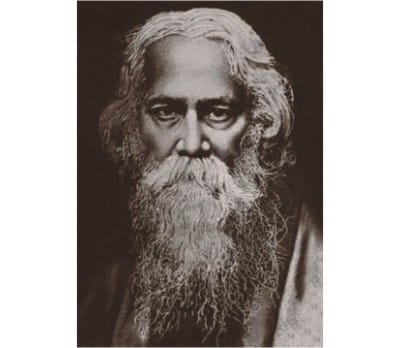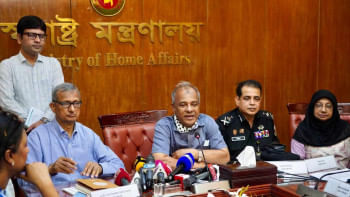Spiritualism in Tagore's Poetry

Rabindranath Tagore's spiritual outlook and humanism were derived from man, nature and Brahma or God. He held the view that the route to spiritual development was from 'body to society, from society to totality and from totality to the spiritual domain'. In this way, the melody of the soul was intertwined with the universal power. But what was required for this inter-mingling was connecting the world of nature with that of human beings. To Tagore, the whole human body appeared to be reverberating with the touch of light, air, affection, love, bliss, joy and electricity, as if embedded in a supernatural flute. Although he might have been influenced by the romantic movements of the time, the Brahma Samaj, the Bauls, Sufism or the Vedanta philosophy of Upanishads, those views were in some respects Tagore's very own. We can very well comprehend how his spirit was liberated by connecting with the universe, the nature and the environment which surrounded him, by looking at the following lines:
"Where He has given himself up through his infinite mirth and youthfulness, there is no dearth of affluence there, no limit to variety, and the riches are unending. There, the sky is lit in a thousand directions wearing the girdles of stars; there, beauty surfaces in so many new forms, the gushing of the spirit never stops."
By connecting with our environment in this manner, our self-consciousness becomes sweeter, deeper and brighter. The man within us grows into a fuller entity. Our soul seems to mingle with His colours and flavour. Rabindranath had identified this phenomenon as devotion. He said, "The poet's task is to ignite this awareness in the consciousness of man, to transform indifference into a newer zeal. That poet is great in the eyes of humans who diffuses human hearts with the attributes of constancy, grandeur, freedom, omnipresence and depth."
This theme of liberation of the spirit is found in many of Rabindranath's poems. There is thus a new excitement for self-expansion in 'Kalpana' "Oh bird, my bird / blind, don't fold your wings now". The formula for revival of the self encompassed the spirit of the universe. This inseparability of the self is made clearer in the poem 'Anobachchhinna Ami' "I saw under the infinite sky / I rock while seated on the swing of light". In the 'Geetanjali-Geetimalya-Geetali' phase, the soul of Rabindranath could become one with the cosmos. Overwhelmed by the unified voice of the waves and the forests, the ocean and the land, the sky and the earth, the poet wrote in his later years:
"I have tied you with my two joints,
Your creations are with you and me,
Your pain today is my pain.
Today you know yourself
With my knowledge.
My surprised eyes are touched by a wand of gold,
It has revived the sense of beauty
In your own consciousness." ('Doita', Shyamoli)
Then in 'Prantik', Tagore says,
"I have bought my freedom from bonds
Crossing the far away sky of soul, the Milky Way,
In the pilgrimage of light, on the fine coast of extinction."
In the same vein, Tagore asserts in 'Nabojatak',
"The human child brings back again and again
The message of eternal hope
As if bringing along
The light of freedom in a new dawn."
The theme is even more pronounced when in the poem 'Shesh lekha' Tagore declares,
"Let the bonds of the world come to an end,
The vast universe has opened its arms,
The soul is fearless to know
The great unknown.''
In these autobiographical poems, Rabindranath strove to look at his own self in different light and perspectives. In the process, he has equated the spiritual force with the eternal force of the universe.
The Bauls and Kirtans of Bangla had a great influence on the poems and songs of Tagore. He stayed almost permanently in East Bengal for around a decade from the age of thirty. He belonged to an affluent high-class society in Kolkata, but was exposed to mainstream Bengali society while living in Shilaidaha-Shahjadpur-Patisar. He was especially captivated by the Baul songs he heard in Kushtia and made wide use of these Baul tunes in his patriotic, love and prayer songs. He was even termed as the greatest Baul of Bangla at that time.
Spiritualism had transcended all aspects of Rabindranath's life and he looked at man and nature as images of God. He wrote in a letter, "If I have realized God or got any hint about him, then it was from this world, its people, trees, animals, dust and soil from all these objects." We therefore find the poet comprehending God as dearest to man and his companion in times of sorrow, as in the volumes of 'Geetanjali'-'Geetimalya'-'Geetali'. In 'Balaka' (1916), he depicted God as the determinant of human destiny. Ultimately, this God finds His place in the heart of man and becomes one and the same in the eyes of the poet.
(Poems from Tagore have been rendered into English by the writer.)

 For all latest news, follow The Daily Star's Google News channel.
For all latest news, follow The Daily Star's Google News channel. 



Comments